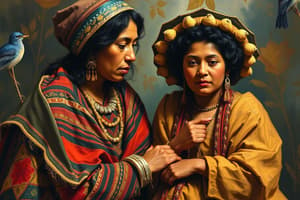Podcast
Questions and Answers
What is a primary characteristic that defines a cultural community?
What is a primary characteristic that defines a cultural community?
- Common cultural traits and practices (correct)
- Economic stability
- Shared political beliefs among members
- Access to advanced technology
Which type of cultural community is specifically based on shared spiritual beliefs?
Which type of cultural community is specifically based on shared spiritual beliefs?
- Geographic Communities
- Ethnic Communities
- Interest-Based Communities
- Religious Communities (correct)
Why is cultural preservation important for cultural communities?
Why is cultural preservation important for cultural communities?
- It encourages competition among cultures
- It isolates communities from outside influences
- It simplifies cultural practices
- It maintains cultural traditions across generations (correct)
What challenge do cultural communities face due to globalization?
What challenge do cultural communities face due to globalization?
Which of the following is a strategy for empowering cultural communities?
Which of the following is a strategy for empowering cultural communities?
How does the concept of shared identity contribute to a cultural community?
How does the concept of shared identity contribute to a cultural community?
What is a common misconception regarding the challenges faced by cultural communities?
What is a common misconception regarding the challenges faced by cultural communities?
Which component is NOT typically considered a characteristic of a cultural community?
Which component is NOT typically considered a characteristic of a cultural community?
Flashcards are hidden until you start studying
Study Notes
Definition
- A cultural community is a group of individuals sharing common cultural traits, values, beliefs, and practices.
Characteristics
- Shared Identity: Members identify with a common culture, fostering a sense of belonging.
- Cultural Traditions: Practices such as rituals, festivals, and customs are integral to their identity.
- Language: Often, members communicate in a common language or dialect, enhancing group cohesion.
- Values and Norms: Shared ethical standards and behavioral expectations guide interactions within the community.
Types of Cultural Communities
- Ethnic Communities: Based on shared ethnic background, such as nationality, language, and heritage (e.g., Hispanic, African American).
- Religious Communities: Formed around shared spiritual beliefs and practices (e.g., Christianity, Islam, Buddhism).
- Geographic Communities: Defined by physical location, such as cities or neighborhoods, often influencing cultural practices.
- Interest-Based Communities: Formed around specific interests or activities (e.g., art, music, sports).
Importance
- Cultural Preservation: Helps maintain traditions and practices across generations.
- Social Support: Provides emotional and social support through shared experiences.
- Civic Engagement: Encourages participation in community and societal affairs, enhancing democratic processes.
- Diversity and Inclusion: Contributes to the richness of society by promoting diverse cultural expressions.
Challenges
- Cultural Assimilation: The pressure to conform to dominant cultures can threaten minority cultural practices.
- Discrimination: Cultural communities may face prejudice or exclusion based on their identity.
- Globalization: The spread of global culture can dilute local traditions and practices.
Strategies for Empowerment
- Cultural Education: Programs to educate members and the broader community about cultural heritage.
- Community Events: Organizing festivals, workshops, and gatherings to celebrate and showcase cultural traditions.
- Advocacy: Promoting policies that protect and support cultural diversity and community rights.
Conclusion
Cultural communities play a vital role in shaping individual identities and societal values, fostering connections among members while also facing various challenges in a dynamic world.
Definition
- Cultural communities consist of individuals united by shared cultural traits, values, beliefs, and practices.
Characteristics
- Shared Identity: Members have a collective identity that fosters belonging and connection.
- Cultural Traditions: Engaging in rituals, festivals, and customs reinforces their cultural identity.
- Language: Common communication through a shared language or dialect promotes group unity.
- Values and Norms: Established ethical standards and behavioral expectations govern interactions.
Types of Cultural Communities
- Ethnic Communities: United by shared ethnic backgrounds, including nationality, language, and heritage (e.g., Hispanic, African American).
- Religious Communities: Structured around shared spiritual beliefs and practices (e.g., Christianity, Islam, Buddhism).
- Geographic Communities: Defined by specific locations, influencing local cultural practices and interactions.
- Interest-Based Communities: Organized around shared interests or activities, such as art, music, or sports.
Importance
- Cultural Preservation: Ensures the maintenance of traditions and practices across generations.
- Social Support: Provides emotional and social backing through shared community experiences.
- Civic Engagement: Encourages participation in societal affairs, positively impacting democratic processes.
- Diversity and Inclusion: Enriches society by fostering diverse cultural expressions and interactions.
Challenges
- Cultural Assimilation: Dominant cultures may pressure members of minority communities, threatening unique cultural practices.
- Discrimination: Cultural communities often encounter prejudice and exclusion based on their identities.
- Globalization: The spread of global culture risks diluting local customs and traditions.
Strategies for Empowerment
- Cultural Education: Implementing programs that educate community members and the public about cultural heritage.
- Community Events: Hosting festivals, workshops, and gatherings to celebrate and promote cultural traditions.
- Advocacy: Supporting policies aimed at protecting cultural diversity and the rights of communities.
Conclusion
Cultural communities are integral to forming individual identities and societal values; despite facing challenges, they foster connections and contribute to cultural richness.
Studying That Suits You
Use AI to generate personalized quizzes and flashcards to suit your learning preferences.




